Early Access popularity growing, but only 25% have released as a full game
Patrick Walker, EEDAR Head of Insights and Analytics, examines the risk and reward of Steam's Early Access program
The success of several Early Access titles like Day Z, Prison Architect, Kerbal Space Program, and Planetary Annihilation has raised the profile of Steam's Early Access program to the point that the publishing model has become more than just a way for the smaller developers to help fund development. Many of the larger publishers, such as Ubisoft, SOE, and Square Enix, are beginning to take notice and evaluate if the strategy makes sense for their titles. At the same time, while the majority of titles released on Steam Early Access have been new IPs (85% of the 367 titles released), niche publishers such as InExile, Paradox, and 1C Company are using the model to publish existing IPs.
On paper, the Early Access publishing model is a "win-win" for developers - you collect sales and grow your user base, all while developing the title and getting feedback from the consumers who are most passionate about your game. And the number of Steam Early Access releases per month has increased dramatically since the official launch of the program in March of 2013.
After several pilot Early Access titles in 2012, Steam officially launched the program in early 2013 with 9 Early Access releases in March. The Early Access publishing model really took off in early 2014 with over 20 games released in 8 of the 9 months since February 2014. 2014 has seen an explosion in the release of Steam titles in general with 1303 releases thus far, compared to 583 releases in 2013, a 123% increase in releases. The growth in the Early Access program has kept pace, with 255 Early Access titles released in 2014 thus far, compared to 103 in 2013, already a 147% increase.
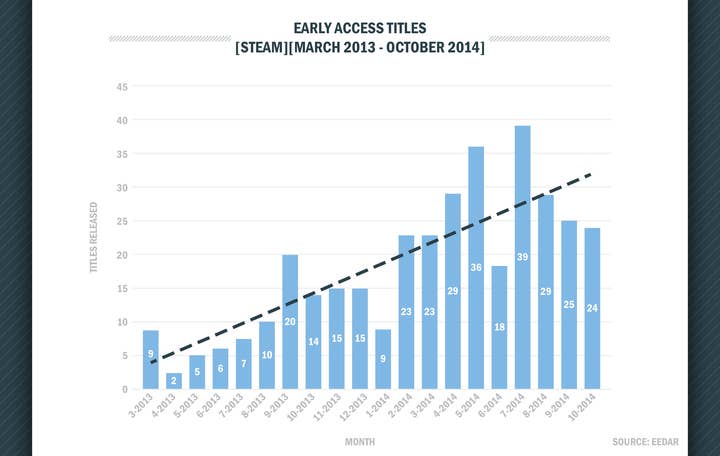
However, it is important to clarify that the release of an Early Access version of a title does not represent the release of a full, completed game. In fact, since the launch of the program, only 25% of the Early Access titles released have been released as full games. And while some of this low release percentage could be explained by recent Early Access releases, Early Access titles from 2013 do not have a significantly higher full game release percentage. Case in point, of the 9 games that kicked off the Early Access program in March 2013 over 18 months ago, only 3, or 33%, have been released as full games:
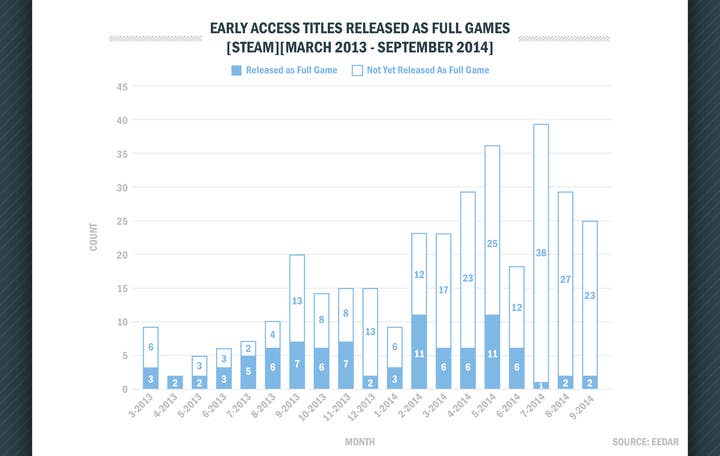
And therein lies the issue. While there are clearly many benefits to an Early Access model, there is also the possibility of a broken promise to the consumer. This is not unlike other models in the games industry, such as crowdfunding through Kickstarter or selling a DLC Season Pass, where the consumer pays up front for promised content. A notable difference between those particular models and Steam's Early Access program is the lack of a firm release window; on Early Access, a game could theoretically stay in development and be sold to consumers indefinitely, whereas a Season Pass is rolled out within a specific time frame and all Kickstarter projects are presented with an estimated "delivery date".
Thus far, Early Access has not received as much negative attention as these similar business models. Quite the opposite, as the Steam Early Access program has provided a legitimacy to paid beta programs outside of Steam. However, it will be interesting to see if this becomes an issue for consumers if the current trend of Early Access games spending a long time in development (or never reaching release) continues.
The Early Access program has been more popular for some genres than others, and some of the most popular genres utilizing the model have been seen the lowest percentage of full game releases. RPG, Action, Shooter, and Simulation are 4 of the 5 most popular genres for developers to release as Early Access products, but they are also 4 of the 5 genres with the lowest rate of reaching full release.
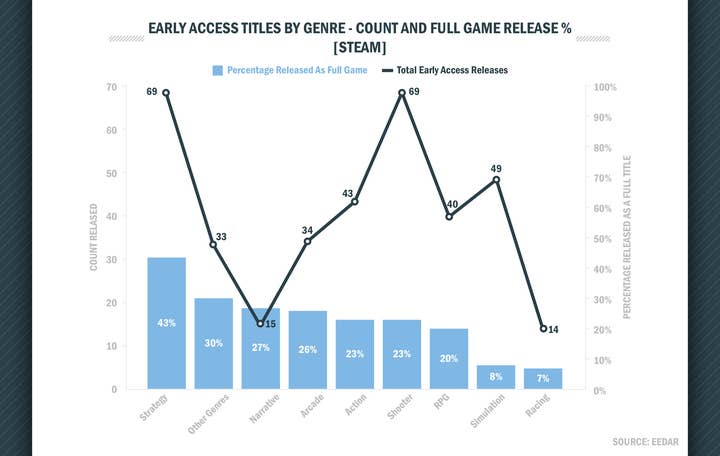
More differences in genre can be seen when looking at the relationship between Early Access pricing and how long released Early Access titles spent in the Early Access program. The average full version has been released 183 days, or 6 months, after the launch of the Early Access edition. The average price of an Early Access game (for the base edition, as many of the Early Access games have multiple pricing options) is approximately $1 more than the full game release. This demonstrates that players are essentially being charged a premium for early access to the title.
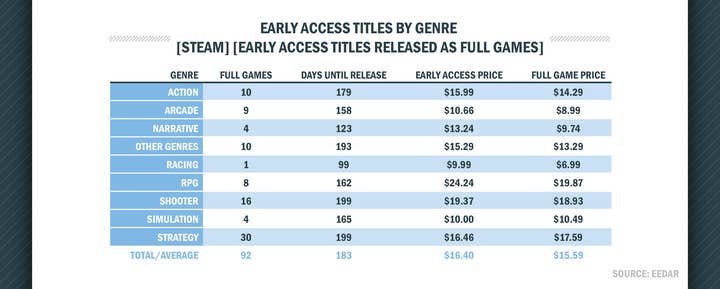
While some genres feature Early Access editions that are cheaper on average than the released version, other genres such as RPG have Early Access editions that are significantly more expensive than the final product. The RPG genre is a particularly strong example of this with Early Access editions that average $24.24 compared to the full game versions at $19.87.
If we examine this from the perspective of time spent in Early Access, players spend the most for the longest wait (on average). This applies to two of the three most popular genres using the program (Shooter and Strategy).
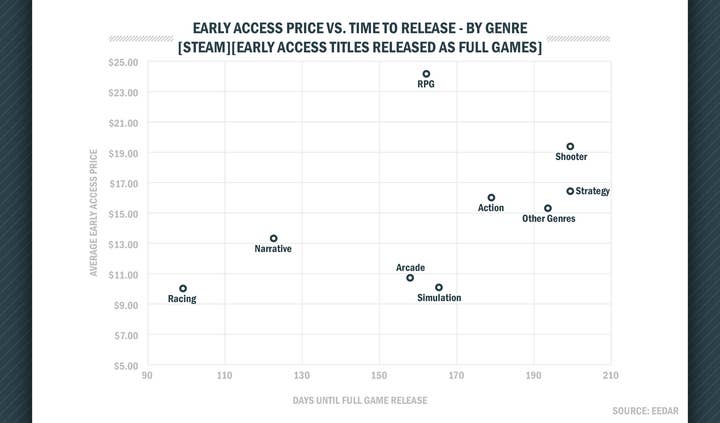
As games continue through Steam Early Access and other paid beta programs, publishers and developers of all sizes should be mindful of both the risks and potential rewards of these new models. While they present an opportunity for early feedback on your product and the potential to build a groundswell of support, they also may come under increased scrutiny if current trends on full game release and pricing continue. Publishers and developers should give Early Access titles careful consideration when determining price, development timeline, and genre.








